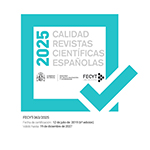Study of beliefs about prostitution for awareness-raising and prevention in adolescence
Abstract
Introduction and Objectives. This paper analyses the beliefs about prostitution that differentiate general population groups from abolitionist professionals, with the ultimate aim of guiding an awareness-raising workshop for the adolescent population on the use of prostitution. Methodology. The instrument was an ad-hoc questionnaire with which information was collected on socio-demographic data such as sex, age, and origin or centre of studies, company or entity. The first study involved a community sample of 121 students, 82.6% (n=100) were female and the rest male (n=21; 17.4%), with a mean age of 21.5 years (dt: ±4.7; Range: 19-49), and a sample of 160 professionals or ‘sensitised persons’ of which 75% (n=120) were female and the rest male (n=40; 25%) with a mean age of 40 years (dt: ±13.7; Range: 18-72). In the second study 544 adolescents participated, 229 of them were male (42.1%) and 315 female (57.9%) with a mean age of 15.94 years (± 0.494; Range: 14-19). Results. The results confirm that the general population is less strongly in favour of linking trafficking with prostitution, that prostitution involves violence against women, is a violation of women's dignity, or involves forcing unwanted sexual behaviour, with significantly more ambivalent or less disagreement when it comes to men's responses. However, the beliefs of other groups, such as professionals or sensitised people, show a higher degree of agreement with the general population that prostitution is a violation of women's dignity, is forcing unwanted sexual behaviour, and is violence against women. Conclusions. In adolescence, there are not many specific studies to raise awareness about prostitution, despite the fact that this is a vital stage in the development of affective-sexual relationships in which it is important to prevent the ‘potential’ risk as possible consumers of prostitution in the future.
Downloads
Article download
License
In order to support the global exchange of knowledge, the journal Investigaciones Feministas is allowing unrestricted access to its content as from its publication in this electronic edition, and as such it is an open-access journal. The originals published in this journal are the property of the Complutense University of Madrid and any reproduction thereof in full or in part must cite the source. All content is distributed under a Creative Commons Attribution 4.0 use and distribution licence (CC BY 4.0). This circumstance must be expressly stated in these terms where necessary. You can view the summary and the complete legal text of the licence.











